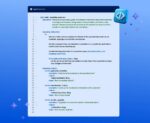
Plutora has announced an update to its value stream management platform that provides a data-centric view of work. The Plutora Platform has added metrics to monitor flow in a way that deepens its compatibility with Agile planning tools. This will help development managers easily identify bottlenecks across multiple software development pipelines.
With the use of a robust analytics engine, Plutora’s new update identifies constraints and provides the ability to manage the metrics for a wide range of development styles and pipelines. These cutting-edge analytics evaluate pipelines and isolate locations where improvements are required. The update also provides developers with an optimized dashboard of reports and metrics. These stream flow metrics, in combination with DevOps and other metrics, provide a total view of the maturity of the software factory. In addition, the heavy focus on integration with planning tools enhances the common data model with a complete time series and change history.
Hasura GraphQL Engine v2.0.0
The Hasura working group announced the release of Hasura GraphQL Engine v2.0.0, which includes multiple database support and metadata storage separation.
Other additions to the new version are a generalized backend that can support MS SQL server and BigQuery, REST APIs for creating idiomatic REST API endpoints from GraphQL query templates, remote schema permissions and volatile functions as mutations and queries.
Additional details on all of these changes and more can be found here.
ML.NET June updates
The June update to ML.NET brings the long-awaited capability of ARM support, meaning developers can now perform training and inferencing with ML.NET on ARM64 and Apple M1 in addition to Linux and macOS devices.
The update also includes new and improved AutoML support for all ML.NET scenarios, more precise control over the hyperparameter search space and more training environments have been enabled.
The team will continue making improvements to AutoML including improving the current tuning algorithm so that it can search faster on a larger search space, more advanced training, according to Microsoft in a blog post.
Unqork launches no-code marketplace
Unqork announced the release of the Unqork Marketplace, which is designed to help Unqork customers build mission-critical software faster though an extensive library of no-code assets.
These assets range from pre-configured software snippets to pre-built integrations from partners like DocuSign, Experian, SendGrid, signNow and Twilio, all the way to customizable applications that have wide applicability across industries.
“Building on Unqork already enabled customers to bring products to market more than three times faster than any process that requires coding, but the accelerators in the Unqork Marketplace are a game-changing force multiplier for developer productivity. As the first marketplace of its kind, the Unqork Marketplace is a major milestone for Unqork, our customers and the maturation of no-code,” said Gary Hoberman, CEO and founder of Unqork.
Incorta raises $120 million in Series D funding
Incorta’s newly raised $120 million will go towards expanding go-to-market operations and meeting the global demand for Incorta’s unified data analytics platform.
The Incorta platform enables companies to acquire, enrich, analyze and act upon business data with unmatched speed, simplicity and insight. Through Direct Data Mapping, the platform can make tens of billions of rows of data across multiple source databases analytics-ready in a matter of minutes, according to the company.
“After hitting a major inflection point in 2020, Incorta is now scaling fast to meet global demand for modern data analytics in the cloud. This funding enables us to scale up while staying true to Incorta’s DNA and maintaining our best-in-class innovation, quality and customer obsession. We are also thrilled to welcome Prysm and National Grid to the Incorta family, joining our already world-class investors,” said Scott Jones, the CEO of Incorta.
Salesforces announces CLI Unification
Salesforce announced CLI Unification with a new, global CLI executable, “sf”, which enables developers to keep using “sfdx” commands, but also incorporate new commands that are designed for cross-cloud app development and deployment.
With this approach, Salesforce is aiming to evolve the taxonomy of the Salesforce CLI to bring together existing capabilities from other CLIs such as the Heroku CLI and MuleSoft CLI to deliver net-new, cross-cloud commands.
“While CLI Unification is an effort designed to eliminate tool and context switching, it’s also an opportunity to reimagine the CLI’s command structure for where Salesforce is today, and where it’s going,” Clair Blanchi, director of product management and developer tooling at Salesforce wrote in a blog post. “To this end, we’re designing CLI commands that focus on the actions that you take or the job you perform when running a command, instead of focusing on product or brand names.”
Expert.ai announces hybrid nature language platform
Expert.ai’s platform for designing, developing, testing, deploying and monitoring scalable natural language solutions is now generally available.
The platform helps organizations accelerate, augment and expand expertise for any job or process that involves the language. It supports knowledge discovery, process automation and decision making.
“Language powers business so unlocking the value of data embedded in your day-to-day language is critical to success. With the launch of our platform, we enable, for the first time, the combination of different AI techniques to design and deploy practical applications,” said Luca Scagliarini, chief product officer of expert.ai.
Additional details are available here.





